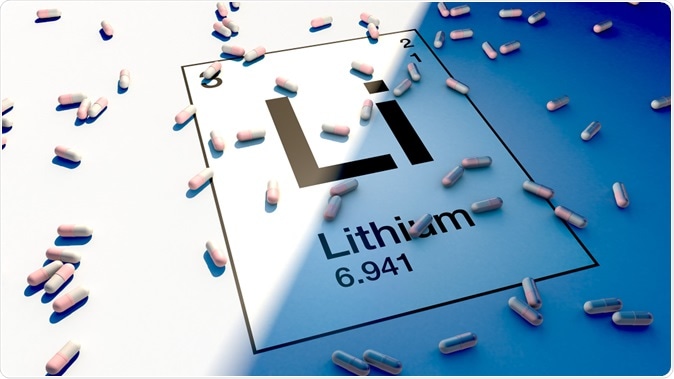A new study on mice, published online in the journal Molecular Psychiatry, on November 14, 2019, shows that the intermittent use of lithium, which is widely used to stabilize the mood in conditions such as bipolar disorder, can correct memory and learning losses due to radiation therapy to the brain in very young animals, even when the lithium is given long after the injury. As a result, the young mice recovered memory and learning capacity to levels comparable with that in non-irradiated mice.

Image Credit: Angel Soler Gollonet / Shutterstock
Childhood cancer
Cancer in children is devastating in many ways, particularly because of the severe effects of chemotherapy and radiation therapy on the developing and immature cells of multiple systems. Radiation to the head is especially harmful in terms of its impact on mood, cognitive processes including thought, judgment, emotions and decision making, and on socialization skills.
About 300,000 children are diagnosed with cancer every year, and it remains a leading cause of death in this age group. Most childhood cancers are leukemias, lymphomas, brain cancer and solid tumors like Wilm’s tumor or nephroblastoma. While survival in low-income countries is at a dismal 20%, in richer regions it is over 80%. Most cancers in children are treated using chemotherapy, surgery and radiation therapy in various combinations. However, all of these have their unique associated adverse effects.
Cranial radiation, or radiation to the head, is required in many childhood cancer conditions, to treat the primary tumor and/or to prevent relapses. However, radiation to the developing brain cells is associated with cognitive impairment, such as difficulty with learning and memory tasks, among other serious effects. In Sweden, 1 in 600 adults have a history of having been treated for childhood cancer, and in about a third of cases this was due to brain tumors.
Lithium is a metal that is known to have a protective effect on nerve cells, to enhance the development of new nerve cells and to oppose tumor growth. Prior research has shown that lithium prevents apoptosis in brain cells as a result of radiation therapy, and thus prevents brain damage. Apoptosis is a cell program which leads to controlled death when the cell is lethally injured or too old to function normally.
The study
The current study was aimed at exploring the role of lithium in rescuing nerve cells in the hippocampus, an important memory area, after cranial radiation. Very young female mice were subjected to one dose of whole-brain irradiation at a dose of 4 Gy on the 21st day of life. They were then divided randomly into two groups. One group received 0.24% lithium carbonate (Li2CO3)-containing food while the other group got normal food, from the 49th to the 77th day of life. This corresponds to adolescence and early adulthood in mice.
The scientists then looked at the improvement in learning, memory and other cognitive abilities. They also assessed the rate of proliferation of new nerve cells in the hippocampus, at day 77, 91 and 105. They also generated a profile of the various genes expressed as well as epigenetic DNA methylation changes in response to lithium therapy.
The findings
The study found that lithium enhanced the proliferation of neural progenitor cells, which give rise to new neurons. Once the lithium was stopped, the new neurons became mature and began to function as part of the brain.
Analysis of the gene expression pattern and DNA methylation showed that the presence of two new factors. These were Tppp and GAD2/65, molecules associated with cell proliferation and neuronal signaling respectively. Lithium encourages the production of these chemicals, which enhance the cytoskeletal structure and the key neurotransmitter GABA, which is essential for the functioning of a mature nerve cell as part of a circuit.
The mice recovered their capacity to learn and to remember things to a level identical to that of non-irradiated mice. Co-researcher Ola Hermanson says, “We're only just beginning to understand lithium's effects on the brain’s ability to repair itself. In this study we observed that only irradiated cells are affected by lithium. Healthy cells were left relatively untouched. This is an interesting and promising result.
Conclusion
Lithium treatment is a novel pharmacological method to reverse damage to hippocampal neuroprogenitor cells due to irradiation. It is capable of encouraging the development of new nerve cells in this brain region. Its effects are seen even when it is started long after the radiation is complete. It may be capable of correcting cognitive impairment in childhood caused by radiation.
The researchers suggest the use of intermittent lithium treatment because it allows the initial proliferation of neural progenitor cells during the lithium phase, followed by differentiation into mature nerve cells once the lithium is stopped. They plan to begin clinical trials so that they can test the efficacy of the therapy on childhood cancer survivors. If successful, this will be a pioneering effort to use drugs to treat radiation-induced brain damage.
Researcher and pediatrician Klas Blomgren says, “Virtually all children who have received radiation treatment for a brain tumor develop more or less serious cognitive problems. This can cause difficulties learning or socializing, and even holding down a job later in life. We must be better at taking care of the damage we cause, and this is what this research is all about.”
Journal reference:
Zanni, G., Goto, S., Fragopoulou, A.F. et al. Lithium treatment reverses irradiation-induced changes in rodent neural progenitors and rescues cognition. Mol Psychiatry (2019) doi:10.1038/s41380-019-0584-0, https://www.nature.com/articles/s41380-019-0584-0